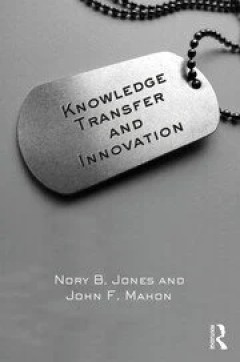Filter by

Tech giants, artificial intelligence, and the future of journalism
- Edition
- -
- ISBN/ISSN
- 9781351013758
- Collation
- -
- Series Title
- -
- Call Number
- -
- Edition
- -
- ISBN/ISSN
- 9781351013758
- Collation
- -
- Series Title
- -
- Call Number
- -

Discourse and digital practices : doing discourse analysis in the digital age
- Edition
- -
- ISBN/ISSN
- 9781315726465
- Collation
- -
- Series Title
- -
- Call Number
- -
- Edition
- -
- ISBN/ISSN
- 9781315726465
- Collation
- -
- Series Title
- -
- Call Number
- -

Knowledge Transfer and Innovation
Knowledge? : what knowledge? -- Explosive innovation : putting knowledge to work -- Leadership -- Culture -- Knowledge corruption -- Training and socialization -- Knowledge structure and processes -- Technologies and social media -- Putting it all together -- A "Rosetta stone" for military skills translation to business.
- Edition
- -
- ISBN/ISSN
- 9781315200163
- Collation
- -
- Series Title
- -
- Call Number
- -

State-sponsored disinformation around the globe: how politicians deceive thei…
Introduction : deceiving from the top : state-sponsored disinformation as a contemporary global phenomenon / Martin Echeverría and Sara García Santamaría -- Theoretical understanding of state-sponsored disinformation / Petros Iosifidis -- Rethinking disinformation for the global South : towards a particular research agenda / Grisel Salazar Rebolledo -- Statistics and state-sponsored disin…
- Edition
- -
- ISBN/ISSN
- 9781032632940
- Collation
- -
- Series Title
- -
- Call Number
- -

Innovations in journalism :comparative research in five European Countries
- Edition
- -
- ISBN/ISSN
- 9781032630410
- Collation
- -
- Series Title
- -
- Call Number
- -
- Edition
- -
- ISBN/ISSN
- 9781032630410
- Collation
- -
- Series Title
- -
- Call Number
- -

SOCIAL MEDIA AND DIGITAL POLITICS: networked reason in an age of digital emotion
- Edition
- -
- ISBN/ISSN
- 9781003386377
- Collation
- -
- Series Title
- -
- Call Number
- -
- Edition
- -
- ISBN/ISSN
- 9781003386377
- Collation
- -
- Series Title
- -
- Call Number
- -

Selbstbestimmung, Privatheit und Datenschutz
In diesem Open-Access-Sammelband werden die aktuelle Herausforderungen für Privatheit und Datenschutz aufgezeigt, die durch die zunehmende Digitalisierung entstehen. Die Beitragsautoren analysieren, wie diese durch Governancemechanismen adressiert werden können. Als Alternative zu einem rein profitorientierten Digitalkapitalismus bzw. Digitalautoritarismus wird für einen eigenständigen euro…
- Edition
- 1
- ISBN/ISSN
- -
- Collation
- -
- Series Title
- DuD-Fachbeiträge
- Call Number
- XXIX, 508

Police Code of Silence in Times of Change
This book explores the contours of the code of silence and provides policy recommendations geared toward creating an environment less conducive for police misconduct. It responds to the recent calls for police reform, in the wake of the perceived illegitimacy of police actions and the protection that the code of silence seems to provide to the police officers who violate the official rules. …
- Edition
- 1
- ISBN/ISSN
- -
- Collation
- -
- Series Title
- SpringerBriefs in Criminology
- Call Number
- XII, 122

Das Formular
Wenn stimmt, was bereits Friedrich Schiller beklagt hat: dass der Mensch in der modernen Gesellschaft „zum Formular geworden“ ist, dann steht mit diesem unscheinbaren Verwaltungs-tool nichts weniger als unsere Lebenswirklichkeit auf dem Spiel. Der erste (Open Access-)Band der Reihe AdminiStudies beschäftigt sich deshalb mit der Funktion und Geschichte von Formularen, jenen institutionalisi…
- Edition
- 1
- ISBN/ISSN
- -
- Collation
- -
- Series Title
- AdminiStudies. Formen und Medien der Verwaltung
- Call Number
- XIII, 324

Modes of Esports Engagement in Overwatch
This Open Access book provides a comprehensive review of the rapidly developing esport phenomenon by examining one of its contemporary flagship titles, Overwatch (Blizzard Entertainment 2016), through three central themes and from a rich variety of research methods and perspectives. As a game with more than 40 million individual players, an annual international World Cup, and a franchised profe…
- Edition
- 1
- ISBN/ISSN
- -
- Collation
- -
- Series Title
- -
- Call Number
- XVII, 229
 Computer Science, Information & General Works
Computer Science, Information & General Works  Philosophy & Psychology
Philosophy & Psychology  Religion
Religion  Social Sciences
Social Sciences  Language
Language  Pure Science
Pure Science  Applied Sciences
Applied Sciences  Art & Recreation
Art & Recreation  Literature
Literature  History & Geography
History & Geography